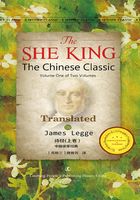
HAN KWANG
1 In the south rise the trees without branches,
Affording no shelter.
By the Han are girls rembling about,
But it is vain to solicit them.

INTERPRETATION. The ordinary view of this ode has been mentioned above. A special interpretation,however, which is worth referring to, has been put upon it. In the 2d of his chapters (尚賢, 上), Mih Teih says that 'king Wăn raised from their rabbit nets Hwang Yaou and T'ae T'een'. We find both those names in the Shoo (V. xvi. 12) as ministers of Wăn.Kin Le-ts'eang (金履祥; Yuen dyn.) and other scholars think, therefore, that this ode had reference to them. This view seems very likely.
Ode 8. Narrative. THE SONG OF THE PLANTAIN-OATHERERS. We are supposed to have here a happy instance of the tranquility of the times of Wăn, so that the women, the loom and other household labours over, could go out and gather the seeds of the plantain in cheerful concert. Why they gathered those seeds does not appear. From the Preface it appears that they were thought to be favourable to childbearing. They are still thought in China to be helpful in difficult labours. Among ourselves, a mucilage is got from the seeds of some species of the plant, which is used in stiffening muslins.
St.1. L.1. 采采,—see on Ode III. The 芣苢 is one of the plantaginacere; probably our common ribgrass, as in the line of Tennyson, 'The hedgehog underneath the plantain bores'.
L.2. 薄言,—both of these terms have been noticed,on Ode II., as untranslateable particles. Nothing more can be said of them, when they are found, as here, in combination.
L1.2,4. 采之= 'let us go and gather them'; 有之,—'we have got them', here they are. Maou, strangely, takes有=藏, 'to collect', 'to deposit'.
St.2. L1.2,4. 掇=拾, 'to gather',—meaning the ears. 捋=取, 'to take',—meaning the seeds.
St.3. 袺—執衽, 'to hold up the skirt',—meaning as in the translation. 襭=扱衽, 'to tuck the skirt under the girdle'; Medhurst says, 'round the waist'.

The breath of the Han
Cannot be dived across;
The length of the Këang
Cannot be navigated with a raft.
2 Many are the bundles of firewood
I would cut down the thorns [to form more].
Those girls that are going to their future home,—
I would feed their horses.
The breadth of the Han
Cannot be dived across;
The length of the Këang
Cannot be navigated with a raft.

The rhymes are—in st. 1,—苢, 采, 苢, 有*, cat. 1,t.2: in 2, 掇, 捋, cat. 15. T.3: in 3, 袺, 襭, cat. 12, t. 3.
Ode 9. Allusive, and metaphorical. THE VIRTUOUS MANNERS OF THE YOUNG WOMEN ABOUT THE HAN AND THE KEANG. Through the influence of Wăn, the dissolute manners of the people, and especially the women, in the regions south from Chow,had undergone a great transformation. The praise of the ladies in the piece, therefore, is to the praise of Wăn. So say both Choo and Maou, the 'Little Preface'ceasing here to speak of T'ae-sze. The first 4 lines of each stanza are allusive, the poet proceeding always from the first two lines to the things alluded to in them or intended by them. The last 4 lines are metaphorical,no mention being made of the poet's inner meaning in them. To bring that out, we should have to supply,—'Those ladies are like.' See the remarks of Lëw Kin(劉瑾; Yuen dyn.) appended to Choo's 'Collection of Comments',—in the Yung-ching She.
St.1. L.1. The south here is difft. from that in Ode II.The connection makes us refer it to the States in Yang-chow and King-chow. 喬木 means 'lofty trees with few or no branches low down'. L.2. The 息 unites well enough with 休 of cognate meaning; but it can hardly be other than an error which has crept into the text,instead of 思, the particle with which all the other lines conclude, elsewhere found also at the end of lines. In those lofty trees, giving no shelter, we have an allusion to the young ladies immediately spoken of, virtuous and refusing their favours. L.3. The Han,—see the Shoo, III. i. Pt. ii. 8. L. 6. 泳=潛行, 'to go hidden in the water', to dive. L.8. Choo define方 (or 魴) by 柎, and Maou by 泭; these characters are synonyms, meaning a raft; here= 'to be rafted', to be navigated with a raft. L.7. The Këang,—see the Shoo on III. i. Pt. ii. 9. —Rafts are seen constantly on the Këang. Does not the text indicate that in the time of the poet the people had not learned to venture on the mighty stream?
St. 2, 3. The first four lines in these stanzas are of difficult interpretation.錯 is explained by 雜, 'mixed','made up of different components', so that 錯薪='bundles of faggots of different kinds of wood, or of wood and grass or brushwood together'. 翹翹 is given by Maou s indicating 'the appearance of the faggots'; but he does not say in what way.

3 Many are the bundles of firewood
I would cut down the southernwood [to form more].
Those girls that are going to their future home,—
I would feed their colts.
The breadth of the Han
Cannot be dived across;
The length of the Këang
Cannot be navigated with a raft.


